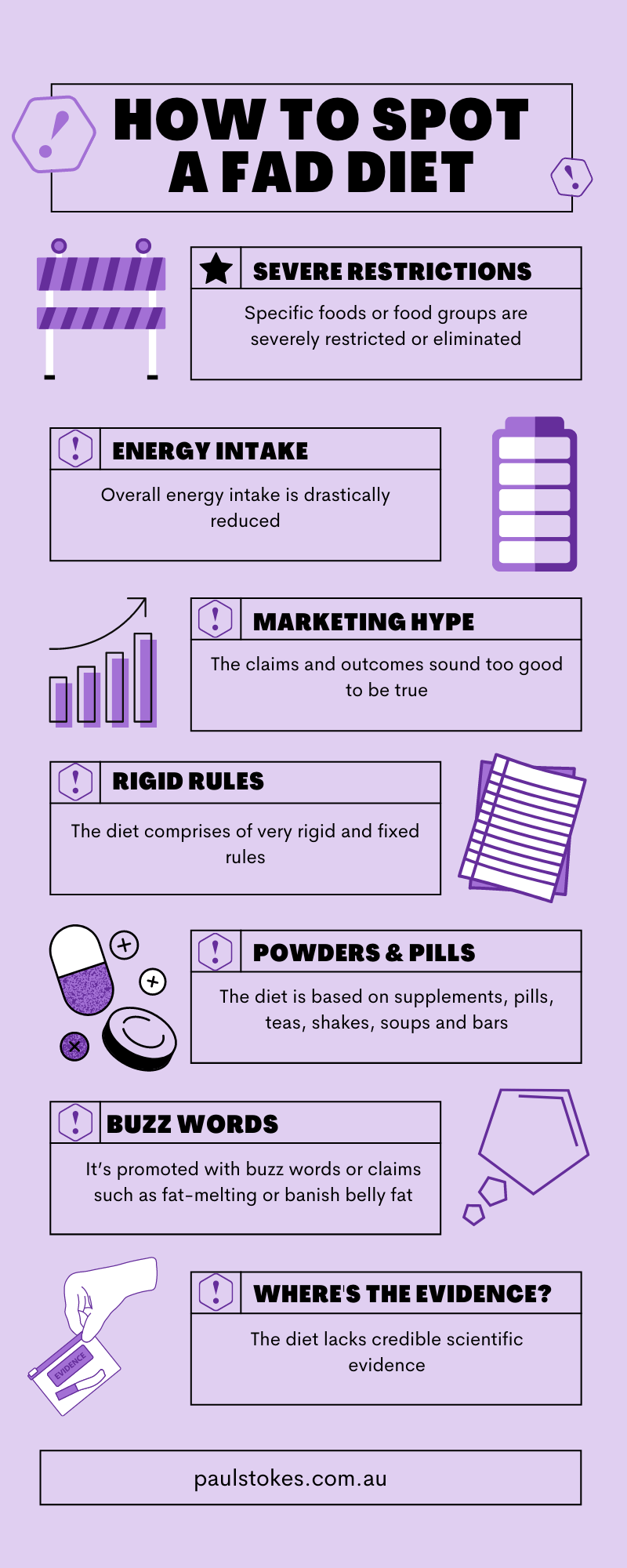Let's be honest, no one enjoys 'dieting'. It sucks. Generally, it means depriving yourself, being strict and cutting out things you enjoy. How often have you started a diet with the best of intentions, only to find a few days later you're back to where you started. When most people diet, they probably have some 6-week program that's boring, restrictive and unsustainable. Not to mention, there's a good chance it's unhealthy too.
More...
Knowing what to do to lose weight can be pretty tricky these days. There's so much conflicting and often misleading information out there. Furthermore, there's often media or influencer hype about the latest superfood or newest diet trend.
There's been a never-ending list of trendy diets and eating habits pushed to the public. Think cabbage soup, Atkins, celery juice, low carb, high fat, keto, intermittent fasting, the alkaline diet, etc.
If we look closer into these diets, we'll say that the way they work is basically the same
Fad diets essentially remove, limit or avoid particular foods, or entire food groups or macronutrients.
Consequently, we're forced to consume fewer calories which likely puts us into a calorie deficit. Ultimately, we lose weight.
However, the extreme degree to which these certain foods are limited is often unrealistic. And that leads to the diet being generally unhealthy and unsustainable.
Additionally, when particular foods are classed as off-limits, we can set ourselves up for failure. What happens when you tell a child not to do something? They become fixated and wait until you're back's turned and will go right ahead. What happens when we tell ourselves we can't have a particular food? We'll tend to crave it more.
This can lead to binges and slip-ups.
Rather than categorising these discretionary foods as 'not allowed' we just need to learn to eat them in moderation.
Low-nutrient foods are part of healthy eating - we just need to make sure we eat nutritious foods more often
Ultimately, the end goal is to create a healthier relationship with food. We want to reach a point where there are no longer restrictions or limitations.
Often, clients will report feeling unmotivated or that they lack willpower. This makes it difficult for them to comply with a strict diet.
If this rings a bell with you, then the chances are that you're current diet isn't right for you. Ideally, we want to find a way of eating that fits in with your environment, preferences and schedule.
That's a big part of the meal plans I create for my clients. We work together to create a plan that's manageable and fits with their goals, habits, current lifestyle and training regime.
Whether your goal is losing or gaining weight, it's such an individualised and personal process. Therefore, finding a sustainable way of eating is crucial if you're to see the results you crave.
Dieting for athletes and active individuals
Bear in mind, losing weight often means our energy levels might dip. Therefore, our performance may suffer within our chosen sport or activity.
To lose weight, we need to be in an energy deficit. That is to say, we must consume less energy than our body burns.
Similar to a car - it won't go as far or as long if the fuel tank's empty.
Additionally, maintaining a calorie deficit may mean we delay the recovery response after though exercise sessions. Our body doesn't have the extra energy and nutrition to repair our muscles, tissues and restock our glycogen supplies. On the other hand, when we eat for performance, we generally consume extra nutrition for just this reason. To promote recovery and enhance our potential.
Where performance matters, we place focus on carbohydrate timing. We also need to consider whether it's sensible to focus on losing weight at a particular time within a training season or sporting calendar.
Determining whether a diet is a fad or more sustainable
So, next time we come across a method of eating that we want to give a go, we want to make sure it's something we can stick to. How do we determine how sustainable a diet is?
If it's cutting our foods, entire macronutrients or looks like it's very low in energy intake, chances are you aren't going to stick with it for long. Likewise, overly restrictive diets tend not to be good for our physical or mental health
How to spot a fad diet:
- Specific foods or food groups are severely restricted or eliminated
- Overall energy intake is drastically reduced
- The claims and outcomes sound too good to be true
- The diet comprises of very rigid and fixed rules
- It’s promoted with buzz words or claims such as fat-melting or banish belly fat
- The diet is based on supplements, pills, teas, shakes, soups and bars
- The diet lacks credible scientific evidence
Want to see the infographic?
Learn how to spot a fad diet at a glance
A sports nutritionist will be able to help you find the most healthy and maintainable approach to losing weight for you. Importantly, we'll still be able to sustain your energy levels and performance within your chosen sport or activity.


